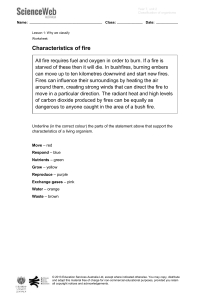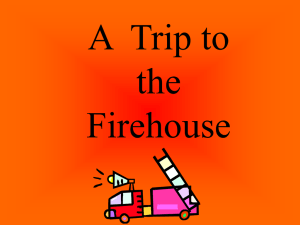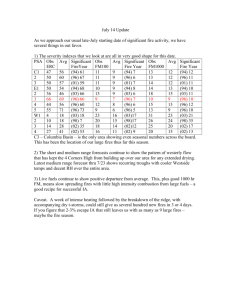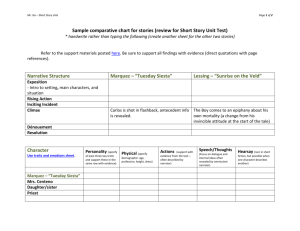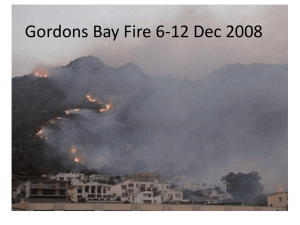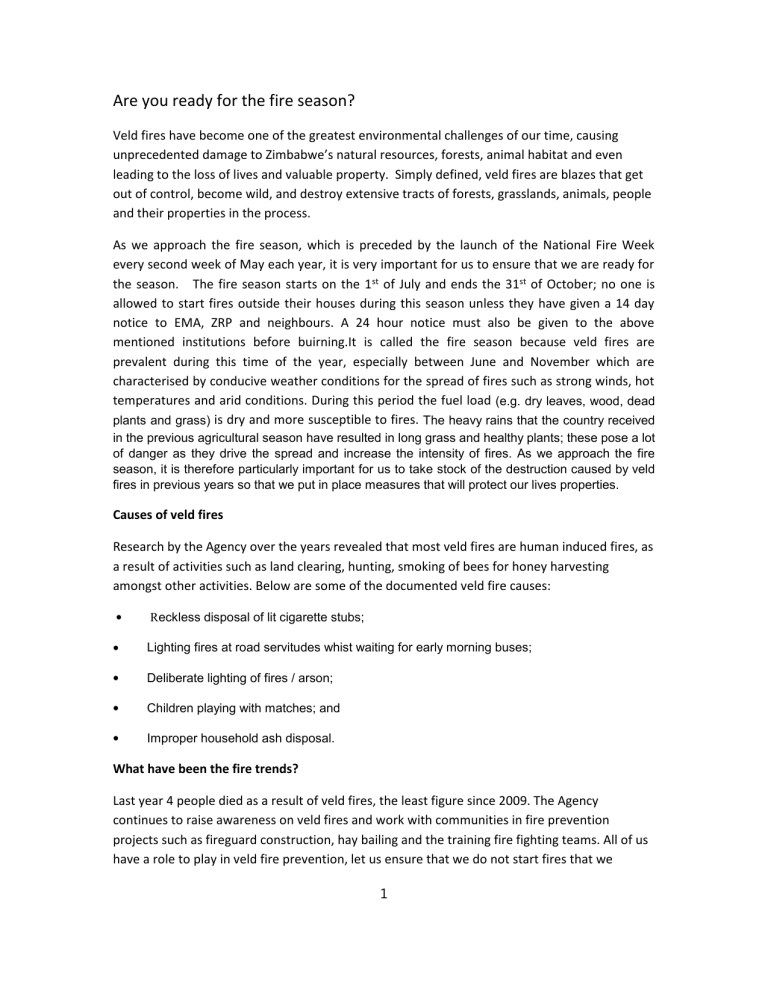
Are you ready for the fire season? Veld fires have become one of the greatest environmental challenges of our time, causing unprecedented damage to Zimbabwe’s natural resources, forests, animal habitat and even leading to the loss of lives and valuable property. Simply defined, veld fires are blazes that get out of control, become wild, and destroy extensive tracts of forests, grasslands, animals, people and their properties in the process. As we approach the fire season, which is preceded by the launch of the National Fire Week every second week of May each year, it is very important for us to ensure that we are ready for the season. The fire season starts on the 1 st of July and ends the 31st of October; no one is allowed to start fires outside their houses during this season unless they have given a 14 day notice to EMA, ZRP and neighbours. A 24 hour notice must also be given to the above mentioned institutions before buirning.It is called the fire season because veld fires are prevalent during this time of the year, especially between June and November which are characterised by conducive weather conditions for the spread of fires such as strong winds, hot temperatures and arid conditions. During this period the fuel load (e.g. dry leaves, wood, dead plants and grass) is dry and more susceptible to fires. The heavy rains that the country received in the previous agricultural season have resulted in long grass and healthy plants; these pose a lot of danger as they drive the spread and increase the intensity of fires. As we approach the fire season, it is therefore particularly important for us to take stock of the destruction caused by veld fires in previous years so that we put in place measures that will protect our lives properties. Causes of veld fires Research by the Agency over the years revealed that most veld fires are human induced fires, as a result of activities such as land clearing, hunting, smoking of bees for honey harvesting amongst other activities. Below are some of the documented veld fire causes: Reckless disposal of lit cigarette stubs; Lighting fires at road servitudes whist waiting for early morning buses; Deliberate lighting of fires / arson; Children playing with matches; and Improper household ash disposal. What have been the fire trends? Last year 4 people died as a result of veld fires, the least figure since 2009. The Agency continues to raise awareness on veld fires and work with communities in fire prevention projects such as fireguard construction, hay bailing and the training fire fighting teams. All of us have a role to play in veld fire prevention, let us ensure that we do not start fires that we 1 cannot contain, no one should die from veld fires. YEAR HECTARAGE FATALITY FIRE INCIDENCES 2009 950 905 10 7 409 2010 1 152 413 25 9 361 2011 713 770 5 6 780 2012 1 320 325 16 1861 2013 1 179 274 4 1981 How can communities prevent veld fires? Fire prevention is the best option to minimise the risks associated with veld fires. This can be achieved through the establishment and maintenance of fireguards. Fireguards are designed to provide access and a safe environment for fire fighting teams to implement controlled burning and effectively manage wildfires. The existing roads and tracks also provide the foundation to implement fire management activities. Fire guards must be constructed before the fire season; anyone without a fireguard during the fire season commits an offence. Communities are encouraged to; Construct standard fireguards which are at least 9m wide on boundaries, and internal fire guards which should be at least 4.5m wide. Fireguards are important because they break fire by removing the fuel load from the fire triangle. These can be constructed by ploughing using ox-drawn ploughs, tractors, disking or hoeing; Form Fire Fighting teams in their farms and villages; Have fire alert systems such as drums, whistles and bells; Inspect fireguards to make sure that they are free from combustible material; Ensure that fire fighting equipment is in place, fire beaters, bowzers/knapsack sprayers filled with water during the fire season; and Listen to weather personnel on the fire danger index so as to improve their state of preparedness. 2 What does the law say? Statutory Instrument 7 of 2007 Environmental Management (Environmental Impact Assessment and Ecosystems Protection) Regulations states that: it is the duty of the land user, owner, or designated authority to put in place fire prevention measures; no person shall deliberately cause a fire outside residential or commercial premises during the fire season (31July-31October); the land user, owner, farmer, lesee, designated authority is responsible for extinguishing all fires on their property regardless of the origin of the fire; and in the case of a fire outbreak any person within the vicinity of the fire other than the user or the owner of that land must extinguish the fire. The Agency encourages everyone to take heed of the above advice so that we reduce the occurrences of veld fires in the country. Reduction of veld fires is everyone’s responsibility, please play your part. What are the effects of veld fires Frequent burning has implication on carbon stocks and emissions, wildlife habitat, human health and life, as well as livelihoods. Veld fires lead to severe environmental degradation by reducing land cover thus, exposing the land to agents of accelerated soil erosion due to increase in overland flow or surface run off and modifications in various ecological processes. Soil erosion leads to the siltation of rivers and dams which reduces their water carrying capacity, inducing floods in low-lying areas and changes in the hydrological cycle. In Zimbabwe, it is now commonly agreed that veld fires are a single significant threat to national economic recovery plans as they are destroying not only pastures necessary for the restocking exercise, but also destroying vast crop plantations, negatively impacting on the country’s food security. Please report all fire incidences to the nearest ZRP, EMA or Forestry Commission offices within 7 working days. 3 Please talk to us we are always ready to listen. Email: eep@ema.co.zw or 04 305543 / Toll free 08080028, sms/whatsapp 0779 777 094, Like our Facebook PageEnvironmental Management Agency or follow us on Twitter @EMAeep. 4
